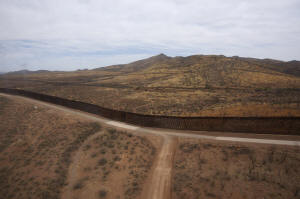|
Colby Jenkins, who is currently working as the assistant defense
secretary for special operations, told a Senate committee that
Trump's designation doesn’t automatically give the U.S. military
the authority to take direct action against the cartels.
Under questioning from Sen. Elissa Slotkin, a Michigan Democrat,
Jenkins said it “helps us unlock the doors” for a broader
government approach to the drug problem.
Slotkin noted that Elon Musk, a top adviser to Trump on
overhauling the federal government, has said the foreign
terrorist designation means the U.S. can conduct drone strikes
against the cartels. Musk posted that on Feb. 19 on X.
Jenkins said it doesn’t, but that now the military can provide
options and be ready if Trump needs more done to protect the
border.
U.S. Northern Command has increased manned surveillance flights
along the U.S.-Mexico border to monitor drug cartels and the
movement of fentanyl and is increasing its intelligence sharing
with Mexico from those flights, Gen. Gregory Guillot told
senators in February.
There are also unmanned U.S. drones conducting surveillance over
Mexico’s airspace, according to Mexican President Claudia
Sheinbaum.
Trump designated many of the gangs and cartels moving those
drugs into the U.S. as foreign terrorist organizations on Feb.
19, further increasing the pressure on their ability to move and
providing law enforcement with what the State Department said
are “additional tools to stop these groups.”
Guillot, commander of U.S. Northern Command, also told senators
that he would seek expanded authority from Congress to conduct
“more advise-and-assist types of operations between our forces
and the tier one Mexican forces,” which are that country’s
special forces units.
All contents © copyright 2025 Associated Press. All rights
reserved |
|




